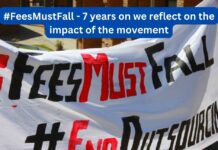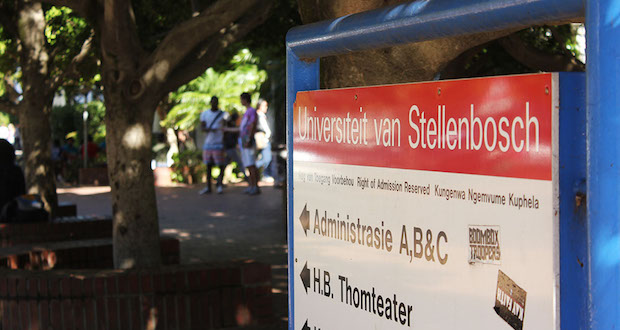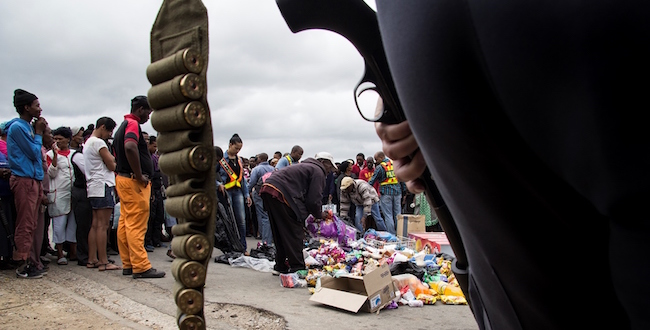
While students at Rhodes University were fighting for their right to a free education, just down the road foreign shop owners were subjected to xenophobic protests and looting. The situation in Grahamstown East is dire and no clear solution is available. THE OPPIDAN PRESS reports.
Last Friday, when President Jacob Zuma announced the moratorium on university fee increases, I ran all the way from the ad hoc newsroom we had set up in the student union to cover the #FeesMustFall protests to join the celebrations at the main Rhodes campus barricade on Prince Alfred Street.
The mood in the crowd was amazing. Students who had not left the barricades for more than four hours the whole week were singing and dancing with tears streaming down their faces next to reporters who were desperately trying to capture the moment while trying their best to swallow their own emotions. We had come face to face with the power students could actually wield to change the world around them and we struggled to process it.
For some of us in that crowd, mostly journalists, we couldn’t fully appreciate the moment. As well as spending most of the week trying to cover as much of the protests on the Rhodes campus as we could, we had been running after police fighting running battles with a whole other set of protesters on the other side of our small city.
These protesters claim that foreign nationals, particularly Muslim Pakistani and Bangladeshi shopkeepers, have been murdering and mutilating residents of Grahamstown. Fueled and supported by local taxi associations, these claims have led to protests about safety and a lack of police effort which quickly escalated into the looting and destruction of foreign-owned shops.
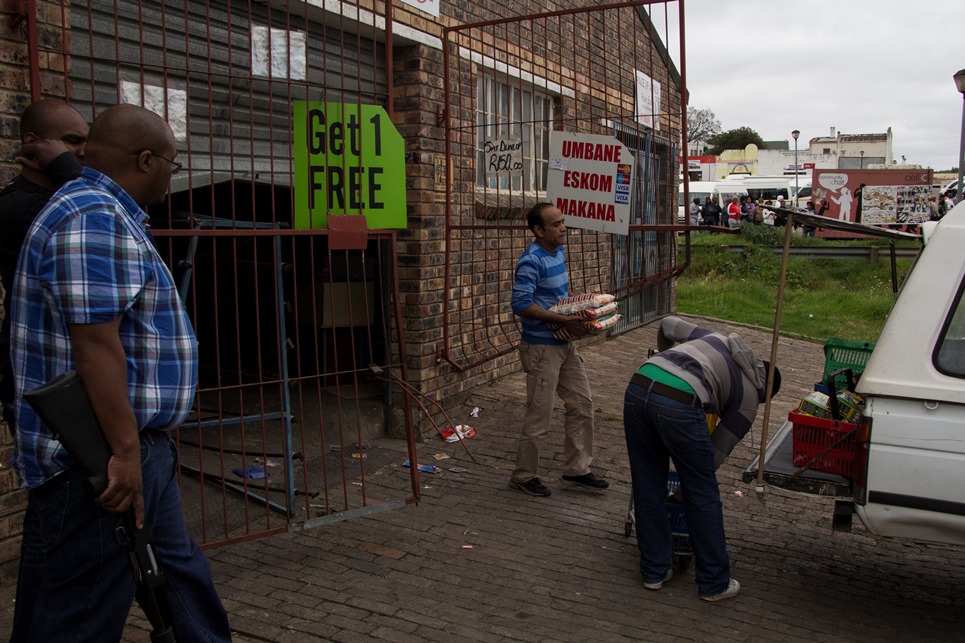
Since September last year, police have found a series of bodies in the Joza area of Grahamstown East. Some of these have been the bodies of women and others have been so badly decomposed that their gender is yet undetermined. Almost immediately, rumours of a serial killer started circulating and have even been featured in national media.
Police have denied these rumours again and again but they have persisted and evolved. People have said that the genitals on the bodies had been mutilated or removed or that a freezer full of body parts had been found or that an “Arab man†with “a long beard†was responsible for all the bodies.
On the ground, I have heard about six or seven versions of these stories, which overlap and change depending on who’s telling it. At least three or four residents asked me, as a journalist, to tell police to bring this Arab man to them so they could deal with him.
The looting and violence has been thorough. Foreign shopkeepers, who are currently being housed in a safe location just outside of Grahamstown, say that around 300 businesses have been entirely cleaned out and that over 500 people have been displaced. Many of them have nothing left but what they were able to carry when they were evacuated.
The police response has been haphazard at best. The Unemployed People’s Movement (UPM), a local activism organisation, had raised the possibility of the rumours sparking xenophobic violence with police and the municipality on 30 September, three weeks before violence actually broke out, but no immediate intervention was made. Anti-Muslim sentiment has also been brewing alongside this, residents say.
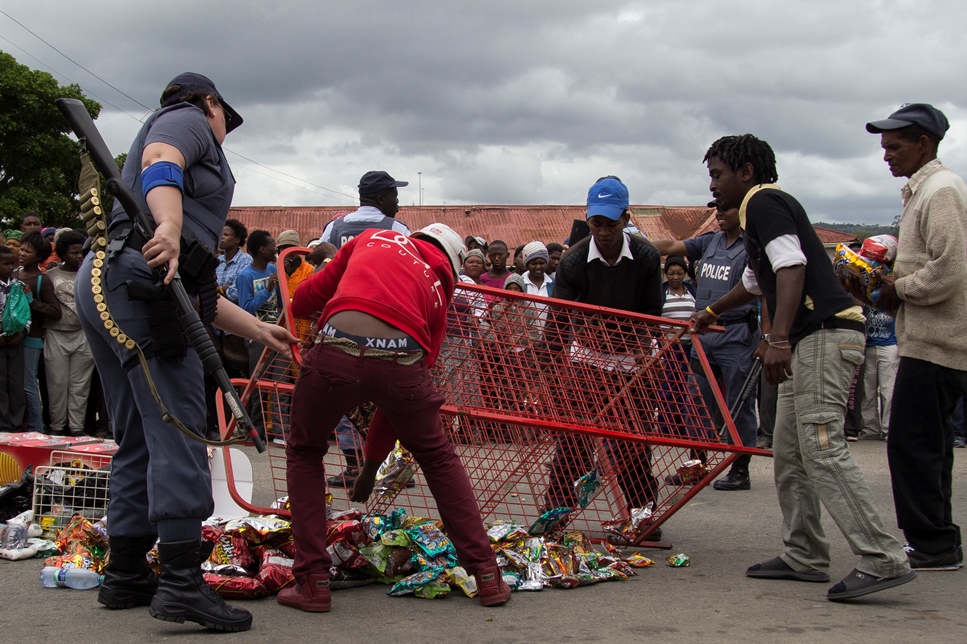
Grahamstown police spokesperson Captain Mali Govender said that all that police had received from UPM were more rumours and that police “needed facts in order to actâ€.
On Wednesday last week, as students tried desperately to secure permission to march to the municipality as part of the national campus shutdown, local taxi associations held their own protest, ostensibly about the conditions of the roads in Grahamstown. Several taxis had the words “They Must Go†or “They Must Burn†painted on their sides. The attacks began immediately after this protest.
Police, supported by Public Order Policing units from out of town and local reservists, clashed with the looters in a series of running battles for the next five days. Unable to do much to disperse the crowds, they resorted several times to a compromise where they allowed shopkeepers to leave safely with some of their stock but to leave the rest for the looters to take.
This prevented deaths but left many of the foreign shop owners with barely anything to their name. Looters have also cleaned out their homes and, in many cases, deliberately and publicly destroyed their ID documents.
Local politicians have done very little to calm the situation. According to a UPM statement, both ANC- and DA-affiliated councillors have spoken publicly in support of either restricting or removing foreign businesses altogether at the abortive public meetings that have been held by the municipality. Many of my colleagues witnessed this lack of a willingness to actually fix the situation firsthand.
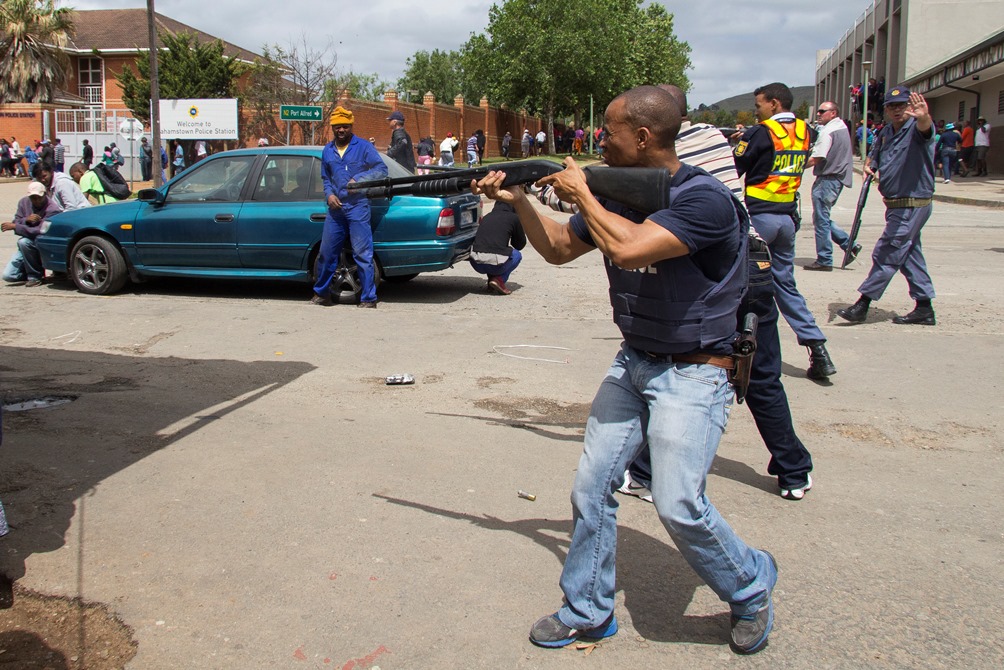
Some of the people most at risk in this chaos are the wives and families of the shopkeepers who are widely dispersed among the homes of friends and family around the city. They released a statement on social media which included a list of demands, chief among which is that Zuma bring his entire cabinet to Grahamstown to handle the situation. They have also stated their support for the #FeesMustFall protests but asked students to support them as well.
There also appears to be a lot of cynical business practice at work behind the support of the taxi associations and some local business owners, which is helping fuel the violence. Many of these shops are crucial to the local economy and provide basic necessities like bread and prepaid electricity. Residents are now having to travel much further to get access to these and spreading their already strained resources even thinner.
In a city like Grahamstown, with more than two thirds of its population poor and unemployed, you can draw the poverty line on a map. Unsurprisingly, the violence began on this line, where lower middle class businesses meet the homes of people surviving day-to-day, where “the city proper” meets the “township”.
Removed from this situation, it is incredibly easy to dismiss the looting as purely xenophobic. It’s easy to describe the looters as uneducated and misinformed. Many of these people have been forgotten by the system. They have no ready access to quality education or services, the support that they do get from the municipality is overburdened and underfunded and there are almost no job prospects available to them.
Faced with any opportunity to improve their circumstances, even if it is temporary and even if it means looting the shops of their neighbours, they take it. Given the scale of the poverty that exists here, this kind of opportunism bred from desperation is understandable. Foreigners are made scapegoats for much deeper systemic issues.
Unfortunately this has left hundreds of people in an incredibly desperate situation. Organisations like UPM and local NGO Masifunde are doing their best to support the displaced families but their resources are already stretched thin. Many students are also helping where they can; the student news organisation I work for has had a donation link up which has already brought in a lot of monetary support for the victims of the xenophobic violence.
But this support isn’t enough. For the victims, Grahamstown is their home and they want to reintegrate into their communities as soon as possible but this will require an about face from local politicians and leaders who have supported the violence and a lot of on the ground work to win hearts and minds in communities, work that is incredibly slow and laborious.
In a city that has never before experienced xenophobic violence on this scale, it may be impossible to fix things. As long as the scale of poverty experienced in Grahamstown persists, this kind of violence may be inevitable.



